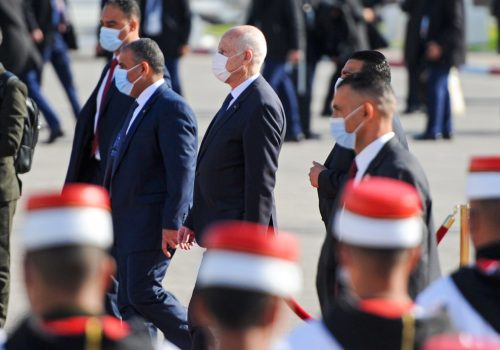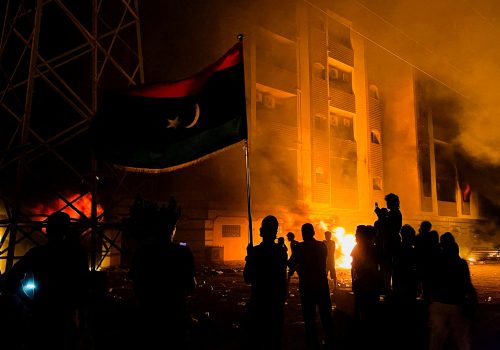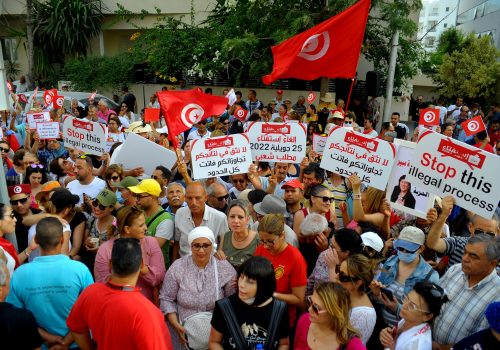Experts react: Tunisia’s president cemented his power grab with a referendum vote. What does it mean for North Africa?
On July 25, Tunisian voters approved the president’s proposed new constitution, to replace the 2014 one adopted by the Constitutional Assembly of Tunisia in the wake of the 2011 Arab Spring. While only 27.5 percent of the country cast a vote, exit polls indicated that more than 90 percent of those who cast a ballot did support the changes. The new constitution will allow President Kais Saied to rule by decree until new elections are held in December 2022. Additionally, it will allow the president to directly oversee the government, shifting from a parliamentary to a presidential system. A year after Saied’s decision to sack the prime minister and freeze parliament (which he later dissolved), critics argue that the country’s post-Arab Spring democratic transition is under assault. Those in favor of Saied’s moves claim he is ridding the country of inept and corrupt leaders who have been unable to govern the country and that he will be able to lift Tunisia out of hardship and poverty. We reached out to our experts for their thoughts on the vote and what it means for North Africa writ large.
Jump to an expert reaction:
Karim Mezran: Watch how Saied treats the opposition now
Emadeddin Badi: Saied’s strategy will embolden other dictators—and lead to his own demise
Alia Brahimi: A democracy dismantled while the West is distracted
Alessia Melcangi: Low turnout signals Saied’s weakness
Alissa Pavia: Saied defies the basic tenets of democracy
Watch how Saied treats the opposition now
It is clear that once Saied called for a referendum without setting a minimum participative quorum, the result could have hardly been different. As expected, only those who supported him went to vote, especially since the opposition called for a boycott, which showed once more how toothless and ineffective such a strategy is. It is not as much a victory for Saied and his consequently decreasing number of supporters, but rather a failure of the opposition to organize a meaningful resistance. It remains to be seen if Saied feels more self-assured and whether he will legally and formally undertake a process of inclusiveness and respect for the liberties and rights that Tunisians have enjoyed in recent years, or whether he will feel more empowered and become an increasingly authoritarian leader.
Western powers, which only seem to be supporting liberalization and pluralism in the countries in their immediate neighborhoods, are now faced with the difficulty of taking a position both in their foreign and economic policies on such a complex situation. The question will be how much to support Tunisia independently of the quality of its government for the sake of stability or maintain and demand the respect of pluralism and human rights and the opening of the political system. The litmus test will be the fate of Rached Ghannouchi, the leader of the Islamist opposition. Ghannouchi has maintained his support for the democratization process throughout the eleven years since the fall of the Ben Ali regime. Will he be respected as such, or will the Saied government turn against him—either imprisoning him or limiting his freedom in any way?
Karim Mezran, director of the North Africa Initiative and resident senior fellow with the Rafik Hariri Center and Middle East Programs at the Atlantic Council.
Saied’s strategy will embolden other dictators—and lead to his own demise
There is little more tragically ironic than killing a democracy through a popular referendum. What is even more dispiriting has been the apathy that surrounded the twilight of Tunisia’s democratic experiment, and the muted response to the increasingly visible signs of popular frustration of Tunisians vis-à-vis the latest developments. In particular, the enabling environment that allowed Kais Saied to hijack a dispirited population’s hopes for a better future to his own venal ends epitomizes the failures of European and American foreign policy in the past decade. A country once hailed as a beacon of democratic hope in a region clouded by authoritarianism has succumbed as Western countries spectated.
The precedent set is not just appalling for Tunisia, but it also sends its own message beyond the country’s borders. Saied’s totalitarian choreography has seen a desperate young population muzzled into silence, forced to watch as an aging constitutional professor turns into a despot. His snake oil of authoritarian stability as panacea had long been rejected by his constituents, yet their boycott of his pseudo-process mattered little. The moral—that popular will does not matter—will neither be lost on neighboring countries’ beleaguered populations, nor on the region’s aspiring and current dictators, who will welcome Saied with open arms.
The only silver lining in Tunisia’s bleak canvas is that Kais Saied’s promise of saving Tunisia through his constitution is bound to quickly prove fictitious. While Tunisia’s socio-economic situation will unfortunately, inevitably worsen with every passing day, Saied will have to own all these failures himself. This paradoxically makes the current denouement of his autocratic consolidation a loss for him and authoritarians of his ilk since it will spell his political demise. Even if it now feels more distant than ever, unbeknown to them, Tunisian youth may be on another date with destiny sooner than they expect.
Emadeddin Badi, nonresident fellow at the Middle East Programs.
A democracy dismantled while the West is distracted
When former Tunisian president Zine El Abiddine Ben Ali ran for a fourth term in 2004—and one of his two handpicked challengers proclaimed during campaigning that he would be casting his own ballot for Ben Ali—the sitting president triumphed with 94.5 percent of the vote. There was a similar air of predetermination around the outcome of Monday’s referendum, in that the poll itself was widely seen as a formality.
Indeed, Saied may be dismantling democracy in real time, enabled by three key opportunities. First, he has channeled widespread disenchantment with the Islamist-dominated parliament towards the model of more secularized one-man rule, tapping into the deep-seated North African culture wars around the appropriate role of Islam in the public space. Many Tunisians thronged the streets when Saied moved to dissolve the inept and dysfunctional Islamist-led parliament last summer, recognizing that the post-2011 political system needed a hard reset— but rather than attempting to renew democracy, Saied soon veered in the direction of autocracy.
Second, in important ways Saied has weaponized the economic despair of increasing numbers of Tunisians in order to consolidate his rule. Millions of citizens are distracted by soaring inflation, food shortages, and the plunging value of the dinar—and thus are too desperate and disillusioned to prioritize or examine the draft constitution.
Third, Saied is counting on a muted Western response at a time when the rise of the liberal world order no longer appears inexorable. With the waning of US hegemony, and much of Europe consumed by existential questions emerging from Russia’s invasion of Ukraine, this is an opportune moment for an opponent of representative democracy to strike. The worry is that under Saied the country will lurch back to the era of Ben Ali and his devoted electoral challenger, marked by the cruelty and farce attendant to unchecked power.
Alia Brahimi, nonresident fellow at the Middle East Programs.
Low turnout signals Saied’s weakness
Exactly one year after Saied’s decision to suspend parliament and dismiss the prime minister, the victory of the ‘yes’ vote (with 92.3 percent, according to Sigma Conseil, a Tunisian polling company) in the constitutional referendum officially ratifies the presidential power grab over the Tunisian institutions. However, despite the result, the low turnout, which the electoral commission put at only 27.5 percent, represents a rift in the popular support base that the president should consider.
The broad consensus that welcomed Saied’s emergency declaration on July 25, 2021, was a clear sign that Tunisians—exhausted by the economic crisis, the paralysis of the political system, and the consequences of the pandemic—renewed their support expressed in the 2019 presidential elections. But this could not be considered as a blank check.
This time, limited participation in the referendum vote underlines that popular support for the president is threatened by two different factors. On the one hand, Saied’s standing is challenged by the economic crisis that heavily affects the lower social strata (his strongest supporters), which are ready to withdraw their backing in the absence of concrete changes. On the other hand, there is an evident increase in hostility from many political activists, civil-society members, judges, lawyers, and political parties (even by the ones who at first supported Saied’s actions) in their participation in the campaign to boycott the referendum.
One year later, Tunisians are facing a disastrous economic situation (the unemployment rate is at 15.5 percent, with an annual inflation rate of 8.1 percent), aggravated by an imminent food crisis (in Tunisia the cereals sector depends on imports, and its main wheat supplier is Ukraine at 41 percent). The recovery will largely depend on the capacity of Saied to secure a new International Monetary Fund rescue package.
In this situation, it is no longer enough to blame Ennahda party as the main culprit of the country’s failures or to blame the corruption of the Tunisian political system through patriotic and populist rhetoric. The current situation risks widening the rift between pro- and anti-Saied factions and could even trigger violence.
The president had called on Tunisians to vote yes “to correct the course of the revolution.” This is something that was already claimed by other neighborhood countries’ governments after the 2011 revolts. And it seems to envisage a step back to the past more than a step forward.
Alessia Melcangi, nonresident fellow at the Middle East Programs.
Saied defies the basic tenets of democracy
Saied’s jubilation for the referendum’s outcome is further proof that he intends to backslide Tunisia into authoritarian, one-man rule. The low voter turnout (27.5 percent) should make any leader suspicious of implementing the referendum’s request, especially when voting on something as important as a constitution, which for all intents and purposes will be the country’s most important legally binding document for decades to come. Yet Saied has no intention of withdrawing his proposed constitution (which immensely expands his powers to the expense of the parliament’s). Nor does he intend to account for the fierce boycott that opposition parties and civil-society leaders have led against his proposed reforms, leading him to defy the basic tenets and principles of a democratic society.
Those who support the president’s decision and believe he will manage to bring the country out of hardship are wrong. In the one year he has been in power, Saied has done nothing for Tunisia except focus on consolidating power by imprisoning opposition leaders, sacking the parliament, and dissolving the judiciary. He has taken no concrete actions to provide food security or curb the steep inflation the country faces, which has been on the rise since September 2021.
Alissa Pavia, associate director of Atlantic Council’s North Africa program.
Further reading
Thu, Jul 21, 2022
Tunisia has a referendum on July 25. Few have as much stake in it as Algeria does.
MENASource By Andrew G. Farrand
Algeria has invested in Tunisia's stability for years, providing it with cheap natural gas, governmental loans, and other bilateral support.
Thu, Jul 7, 2022
Libyans are protesting. What can they learn from the events rocking Tunisia?
MENASource By Karim Mezran
Tunisia is experiencing one of its most difficult moments since its independence from France in 1956.
Fri, Jul 22, 2022
Tunisia is the sole survivor of the Arab Spring. It was nice while it lasted.
MENASource By
On July 25, Tunisians return to the polls for a historical vote: a referendum on whether to repeal the democratically-drafted constitution of 2014 and replace it with a new charter immaculately conceived by President Kais Saied.
Image: FILE PHOTO: Demonstrators hold flags as they gather during a protest in opposition to a referendum on a new constitution called by President Kais Saied, in Tunis, Tunisia June 18, 2022. REUTERS/Jihed Abidellaoui/File Photo


